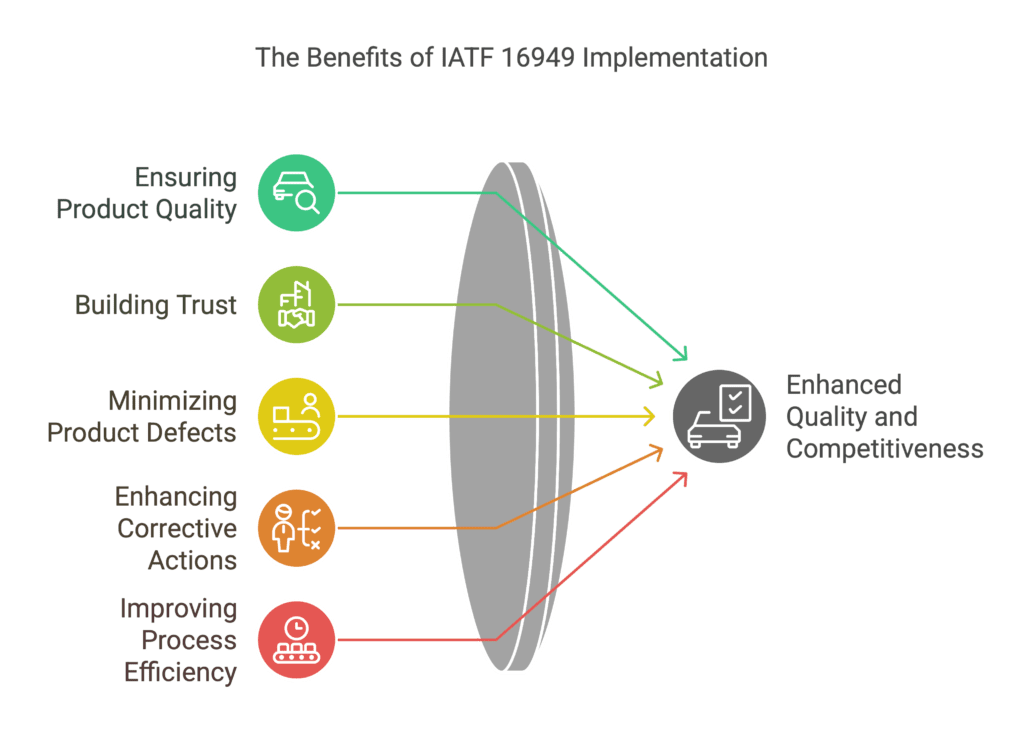IATF 16949 is an international quality management standard in the automotive industry, developed by the International Automotive Task Force (IATF) to replace the ISO/TS 16949 standard.
This document defines the requirements for quality management systems in the automotive industry. IATF includes specific requirements for the design, production, and supply of parts and components for the automotive sector. It is a standard applied by suppliers and manufacturers in the automotive industry who want to ensure the high quality of their products, minimize the risk of defective products, and increase the trust of customers and business partners.
Introduction
The International Automotive Task Force (IATF) developed this standard, consisting of prominent car manufacturers such as:
- BMW Group
- Daimler AG
- Volkswagen AG
- Groupe Renault
- Stellantis (formerly FCA and PSA)
- Ford Motor Company
- General Motors
- Jaguar Land Rover (JLR) Limited
- Iveco
- Geely Group
- Volvo
Additionally, the IATF organization includes National Automotive Industry Associations, known as original equipment manufacturers (OEMs):
- AIAG (U.S.)
- ANFIA (Italy)
- FIEV (France)
- SMMT (U.K.)
- VDA (Germany)
Certification to this specification is required from all suppliers affiliated with IATF. These suppliers, in turn, must cascade the requirements to their suppliers, ensuring certification throughout the supply chain.
Moreover, IATF 16949 integrates the requirements of existing French, American, Italian, and German management system standards within the global automotive industry to enhance quality across the supply chain.
It’s worth noting that while IATF 16949 certification is not mandatory, an increasing number of manufacturers and suppliers in the automotive industry require it from their business partners. This is because it can positively impact their reputation and market position.
Who can be certified to IATF 16949?
IATF 16949 certification is intended for companies involved in designing, manufacturing, or supplying parts and components for the automotive industry.
To achieve certification, manufacturers and suppliers must meet requirements related to quality management systems and standards, such as ISO 9001:2015. They must also conduct internal quality audits and undergo external audits by accredited certification bodies.
The certification process involves several stages, including a preliminary company assessment, developing corrective action plans, conducting internal and external audits, and obtaining a certificate confirming compliance with the standard.
The development of the IATF 16949 standard – History and changes
The current edition of the IATF 16949 standard was introduced on October 1, 2016. It is the first version of this document. However, there were significant precursors before its inception. In 1994, the QS 9000 standard was developed as a supplement to the ISO standard. General Motors, Ford, and Chrysler jointly developed this document.
These manufacturers, having common suppliers, decided to standardize quality requirements for their supply chain. Thus, QS 9000 marked the first step in the history of standardization related to the automotive industry, particularly concerning quality management systems.
In 1999, the first edition of the ISO/TS 16949 standard was introduced, replacing QS 9000. From that point on, they integrated the requirements of this standard and the ISO 9001 standard. Subsequent significant updates to the standard occurred in 2002 and 2009, corresponding to changes in the ISO 9001:2008 standard.
The most significant change occurred in 2016 when the ISO 9001 standard was updated, and the IATF 16949 standard was issued, separating from it.
Nevertheless, both organizations, ISO and IATF, continue to collaborate to ensure alignment between these two documents.
For organizations, this information is particularly important because they now need to procure two documents:
- the ISO 9001 standard
- and the IATF 16949 standard
A new perspective on the process approach
Both the IATF 16949 standard and the ISO 9001 standard introduce the process approach as the foundation of quality management. This concept is not new. Why? Because it dates back to the 1980s when Total Quality Management became increasingly popular. However, only now has it become an integral part of automotive industry standards.
The process approach focuses on organizing activities around processes instead of functions, which leads to greater flexibility and the ability to respond to environmental needs. The main advantage is the ability to react more quickly to changes and easier communication and information flow between different areas of the organization.
The ISO 9001:2015 standard emphasizes that organizations perform activities more effectively when they base them on a process approach.
Similarly, the IATF 16949 standard promotes the process approach in various aspects, such as internal audits or supplier management. For example, during a production process audit, considering different functions such as quality control and logistics allows for a better understanding and assessment of process efficiency.
Benefits of Implementation
While IATF 16949 certification is not mandatory, it offers numerous benefits to individuals and businesses in the automotive industry:
Ensuring product quality: Understanding the standard’s requirements helps meet customer expectations and ensure product quality.
Building trust: Certification increases trust among customers and business partners, enhancing business development and competitiveness.
Minimizing product defects: Compliance with the standard reduces the risk of defective products by establishing robust quality procedures and controls.
Enhancing corrective and preventive actions: Knowledge of the standard aids in identifying and addressing root causes of quality issues, leading to more effective corrective and preventive actions.
Improving process efficiency: Implementation of IATF 16949 improves production processes and quality management, resulting in time and cost savings.
Career development: Familiarity with the standard enhances professional skills and career prospects in the automotive industry.

In summary, the requirements of the IATF 16949 standard are stringent, covering aspects such as risk management, continuous process improvement, monitoring of corrective and preventive actions, and internal and external audits. Moreover, it poses a challenge for companies striving to achieve and maintain high-quality products.


